Commercial Property FAQs
You will no doubt have a few questions about the advice and support our Commercial Property team offers as well as the processes involved before you decide to instruct your Solicitor.
We have captured some of the questions which we are frequently asked below. Remember all our teams also offer a free initial consultation.


